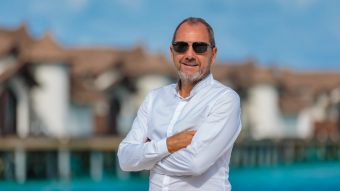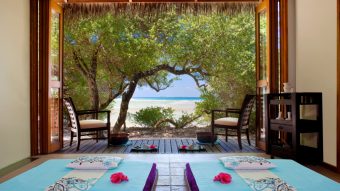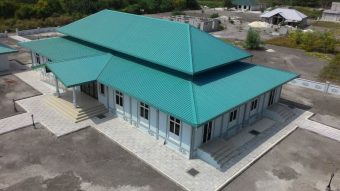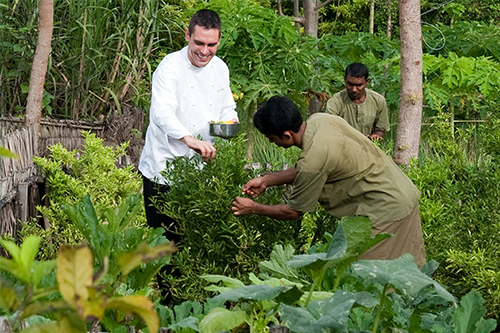
Can we really create Wealth from Waste?
[vc_row][vc_column width=”1/1″][vc_empty_space height=”20″][vc_text_separator title=”The Eco-Centro team at Soneva Fushi prove that it’s possible” title_align=”separator_align_center” color=”grey”][vc_empty_space height=”15″][vc_column_text]
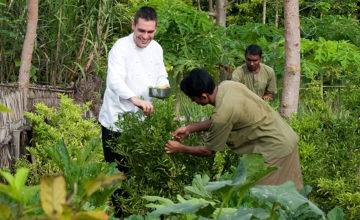 Soneva Fushi, on the island of Kunfunadhoo, is one of the largest Maldivian resorts at 1400 metres in length. As you approach from either sea or air, Soneva looks less like an established resort and more like an uninhabited or agricultural island. The absence of water bungalows is immediately apparent, and there are only three short jetties extending into the lagoon – arrivals, supply and the modestly sized Bar(a)bara bar. Within a minute of setting foot ashore, it’s clear that despite being the oldest resort in Baa Atoll, most of the island remains covered in unspoilt natural jungle.
Soneva Fushi, on the island of Kunfunadhoo, is one of the largest Maldivian resorts at 1400 metres in length. As you approach from either sea or air, Soneva looks less like an established resort and more like an uninhabited or agricultural island. The absence of water bungalows is immediately apparent, and there are only three short jetties extending into the lagoon – arrivals, supply and the modestly sized Bar(a)bara bar. Within a minute of setting foot ashore, it’s clear that despite being the oldest resort in Baa Atoll, most of the island remains covered in unspoilt natural jungle.
There are great financial pressures for resorts to maximise land usage and squeeze in as many rooms and guest facilities as possible. So it takes a clear vision and high degree of commitment to maintain such a big island with less than seventy villas and residences (although some are very large!) Husband and wife team founders Sonu and Eva pioneered the eco-luxury style here in the Maldives 20 years ago, and have been able to stay close to their roots with a personal involvement in resort operations.
[/vc_column_text][vc_separator color=”grey”][/vc_column][/vc_row][vc_row][vc_column width=”1/1″][vc_column_text]
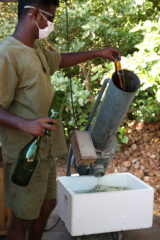 Getting down and dirty at the Eco-Centro
Getting down and dirty at the Eco-Centro
The hosts for my trip were Gordon (Waste to Wealth Manager) and Ish (Social & Environmental Responsibility Fund Manager), so we headed straight to the Eco Centro. Established in 2008, Soneva Fushi’s solid-waste management centre represents the hub of the resort’s integrated policy of reusing and recycling. Approaching from a winding jungle path, Eco Centro opens into a large clearing and a hive of activity reminiscent of a small farm. Tidy piles of segregated materials greet you, some of it awaiting collection by SecureBag (waste disposal company, Malé) and some destined for Thilafushi (national garbage island). But where Soneva makes a real difference is being able to reuse and recycle 74% of all solid waste, with an impressive overall carbon negative footprint of 69 tons per year.
Estimations globally across the hospitality industry show that on average, a restaurant will waste ½kg of food per person per meal, and 1kg of food per hotel guest per day. And these figures are generally higher for buffet-style restaurants and in luxury resorts, both of which are popular in the Maldives. Traditionally, organic waste has been dumped into the ocean, but with annual tourist arrivals exceeding one million visitors per year, this method is already unsustainable. Typically, some 50 to 70% of hotel waste is organic, so there is a huge potential for recycling methods to make a real difference, and to create wealth from waste.
The staff at Eco-Centro are committed to recycling 100% of all food waste, and are currently experimenting with active aeration methods of composting, to make nutritious fertilisers for the herb and vegetable gardens. The jungle around the island is discretely trimmed back, the cut branches go into the wood chipper, which is then mixed with fallen leaves and kitchen waste to form the basis of the compost pile. There are several large mounds of composting materials, each at a different level of decay, and all being lovingly monitored, watered and regularly turned to encourage decomposition. After just a few days, the aerobic bacteria have got to work and the temperature of the mound exceeds 75°C. After a short rain shower, we see a reassuring plume of steam rising up. The team are still refining their process to produce the best quality of compost in the shortest amount of time, but already the end product becomes a deep brown colour in just 8 weeks, developing a rich earthy aroma that belies its origins.
From Brown to Green
The gardens are filled with dozens of different fruits, vegetables and herbs, all neatly contained in long square-metre beds for easy tending and management. The freshly made compost is put to immediate use, and the absence of chemical fertilisers and pesticides ensures all produce is 100% organic. An unusual feature of the garden is the mushroom hut and lab, with an exterior resembling an igloo ! Inside however, the temperature and humidity are controlled, and different species of Asian mushrooms sprout from expertly prepared rolls of compressed sawdust. The team continues to experiment with different species of spawns and various micro-climate settings, but the mushrooms grow very rapidly and can be harvested every few days.
With food output from the gardens totalling one tonne per month, Soneva is already making a significant dent in the amount of fresh produce it needs to import. The concept of “food miles” can be more appropriately renamed “food metres”, as the short stroll from garden to kitchen enables fresh produce to reach the guest table on the very same day. In the global marketplace, it’s refreshing to see Soneva putting so much effort into home-grown produce to provide carbon-negative “intelligent luxury”.
From Brown to Black
The Eco Centro team have been making charcoal since 2009, and recently built a large “adam-retort” kiln to improve efficiency and increase output. Waste wood and tree off-cuts are collected from around the island and cooked in the kiln for a full day, where the lack of oxygen ensures all water and impurities are driven away. The resulting charcoal is used for barbecues and to fuel the pizza and tandoori ovens; it is also a good soil improver. The resort is now self-reliant in charcoal, saving $24,000 a year and reducing that all-important carbon footprint.
Meanwhile, the resort’s original smaller kiln is being used to produce charcoal from coconut shells. Some of this charcoal is then ingeniously used to make barbecue firelighters, by crumbling into egg packaging trays and covering with molten wax from leftover candle stubs. When solidified, sections can be torn off into individual ‘firelighters’, which set alight easily and burn for 15 minutes to get the barbecue started. A very useful and ingenious way to recycle!
Many thanks to my hosts at Soneva Fushi, for a fascinating and enjoyable trip: Karen Merrick (Resort Manager), Gordon Jackson (Waste to Wealth Manager) and Isha Afeef (Social & Environmental Responsibility Fund Manager).
[/vc_column_text][vc_separator color=”grey”][/vc_column][/vc_row][vc_row][vc_column width=”1/1″][vc_single_image image=”2696″ border_color=”grey” img_link_target=”_self” img_size=”full”][/vc_column][/vc_row]



